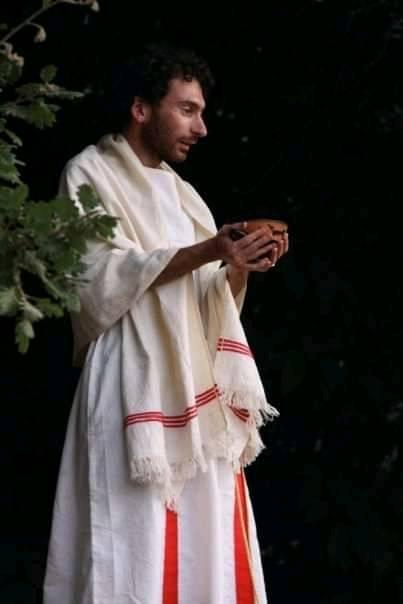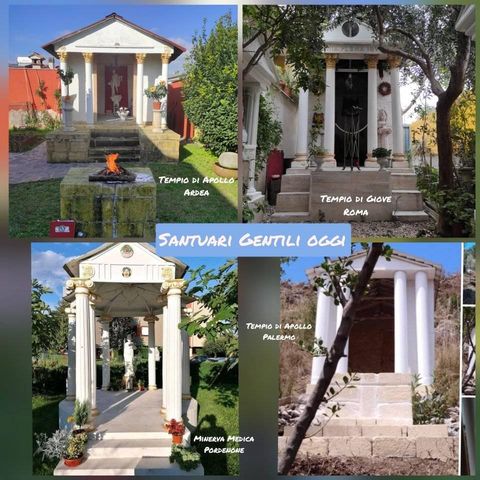
Last Thursday the Associazione Tradizionale Pietas, which practices the Religio Romana tradition, reorganized as a new legal entity, Pietas – Comunità Gentile. Pietas is now recognized under Italian law as a valid national religious community, lending additional legitimacy to the Religio Romana.
Pietas takes its name from the chief virtue of the hero Aeneas in Virgil’s Aeneid, and means “duty,” “religious behavior,” or “devotion” in Latin. The organization has been working for several years to establish itself as a recognized entity. Pietas is based in Rome and has affiliates in cities throughout Italy, including Bologna, Genoa, Milan, and Palermo. Its new status allows it to function as an umbrella religious entity and charity for all of its Greco-Roman religious affiliates.

Pietas logo [courtesy]
Pietas and its precursors have been active in Italy since the 1960s. In 1981, professor Gianfranco Barbera founded a formal community of scholars and professionals, joined by their interest in and reverence for ancient Roman culture and religious practice. By the year 2000 – or, as Pietas would say, the year 2753 ab urbe condita, “from the founding of Rome” – Barbera had laid the groundwork for groups to use practices from Rome and Magna Graecia.
Since its founding, the group has established various temples and sanctuaries. In 2008, Pietas founded Aedes Romae Pietatis in Rome as its main temple sanctuary. Shortly after, they dedicated an altar to Jupiter, and several more temples have been built throughout Italy since. Each of these temples was built as essentially individual, self-funded projects.
Pietas’s new legal entity will allow the organization to accelerate its work of building temples. It will also allow the group to collaborate with other religious bodies, both nationally and internationally.
“This moment is very important for Pietas,” the organization said in a press release. “With this act, a great milestone has been reached, the result of years of work and practice. From here begins a new path aimed at the growth of classical religion in the Beautiful Country.” (“Beautiful Country” is a classical poetic epithet for Italy.)
At its founding session, the new entity elected Giuseppe Barbera, the current president of Pietas, as its spiritual leader, bestowing on him the title pontifex maximus. Giuseppe Barbera is the son of the organization’s founder, Gianfranco.

Giuseppe Barbera, Pontifex maximus [Courtesy]
“Today, in 2020,” the pontifex told The Wild Hunt, “we formalize the initiatory reality that has allowed the growth of the community, the construction of temples, and the collaboration with foreign realities that, like us, deal with Gentile Tradition in their own countries.”
Freedom of religion is guaranteed under Italy’s 1947 constitution; previously Roman Catholicism was the state religion. Despite the disestablishment of a state religion, religious life in Italy is dominated by the Catholic church: 95% of Italians are baptized as Catholic, and Vatican City is wholly enclosed within the city of Rome. While participation in Catholicism and support for the policies of the Holy See varies substantially individually, the influence of the Catholic Church has created a national system by which a religious organization can benefit from income tax obligations.
Known as otto per mille, “eight per thousand,” under this system, Italian taxpayers choose who will benefit from a compulsory 0.8% contribution of their annual income. Such groups can be an organized religion recognized by Italy or a sanctioned secular assistance program.
While access to this benefit may be part of Pietas’s future, Pontifex Barbera dismissed the thought that it was the organization’s main goal in this reorganization. “Many people who contact us from the outside focus their attention on awards aimed at achieving the eight per thousand and other state funding,” he said. “For us, it is important to focus on the real value of the classical tradition, on the concrete results of the practice, and on the effective transformation of homines into viri – that is, from humans made from mud to humans made of vis, inner strength.”
A core element of Roman traditional religion is the mos maiorum, “ancestral custom,” an unwritten code that guides social norms, customs, and religious devotion. The code consists of trustworthiness, duty, religious practice, discipline, self-control, virtue, and honor. The fulfillment of these expectations instigates spiritual transformation.
Pontifex Barbera highlighted a long list of work that must still be done, which includes further development of Pietas’s ritual manuals, construction of temples, and growing the community, which legal recognition will facilitate. Recognition “is a good thing because it will allow the community of practitioners to be better protected in their feelings and in their spirituality and spiritual knowledge,” he added. “It guarantees the protection of the spiritual rights of practitioners.”

Newly constructed temples by Pietas [courtesy]
When asked about what is next for Pietas, Pontifex Barbera noted the organization has over three hundred affiliates and partners in Italy and beyond. “In Italy, we have erected three sanctuaries in Rome. The Templum Iovis (or Sanctuarium Pietatis), the Temple of Egeria and the Templum Minervae at Olgiata,” he said. “In Lazio we have a beautiful sanctuary in Ardea, the Templum Apollinis, with basins for ablutions, bookstore, B&B, gym, rooms for banquets, conferences, and meetings. The gardens that develop around the temple are very well cared for and available. In Pordenone we created the Templum Minervae Medicae, a reference for practitioners of the Triveneto, in Palermo a sanctuary dedicated to Apollo. Other temples are planned to be built in the coming year.”
Pontifex Barbera invited anyone interested to visit the Pietas website which is undergoing renovation, like their Facebook page, or subscribe to their magazine and other resources. He also noted that their headquarters welcomes visitors with prior appointment, “Our official office is in Rome, at the Sanctuarium Pietatis, where the Templum Iovis stands, in the Torre Gaia district.”
Pontifex Barbera said the Pietas community looks forward to engaging with other organizations and communities. “In this historical moment,” he said, “Pietas is making important steps forward in the worship of the gods and in communication with the world.”
The Wild Hunt is not responsible for links to external content.
To join a conversation on this post:
Visit our The Wild Hunt subreddit! Point your favorite browser to https://www.reddit.com/r/The_Wild_Hunt_News/, then click “JOIN”. Make sure to click the bell, too, to be notified of new articles posted to our subreddit.